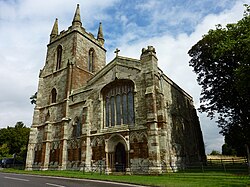The Priory Church of Saint Mary, Bushmead, commonly called Bushmead Priory, was a monastic foundation for Augustinian Canons, located at Bushmead in the County of Bedfordshire in England. It is a Grade I listed building.

Calke Abbey is a Grade I listed country house near Ticknall, Derbyshire, England, in the care of the charitable National Trust.

Canons Ashby House is a Grade I listed Elizabethan manor house located in the village of Canons Ashby, about 11 miles (17.7 km) south of the town of Daventry in the county of Northamptonshire, England. It has been owned by the National Trust since 1981 when the house was close to collapse and the gardens had turned into a meadow. "The Tower" of the building is in the care of the Landmark Trust and available for holiday lets.

Lower Catesby is a hamlet in the civil parish of Catesby, Northamptonshire, about 4 miles (6.4 km) southwest of Daventry. Lower Catesby is beside the nascent River Leam, which rises about 1 mile (1.6 km) to the south in the parish of Hellidon. The Jurassic Way long-distance footpath passes through Lower Catesby. The population of the hamlet is included in the civil parish of Hellidon.

Thorpe Mandeville is a village and civil parish in West Northamptonshire, England about 6 miles (10 km) northeast of Banbury in neighbouring Oxfordshire. The hamlet of Lower Thorpe is just north of the village.
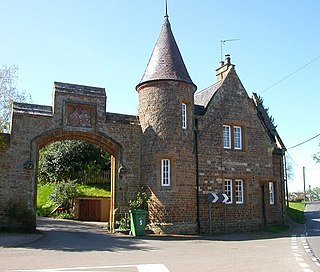
Moreton Pinkney is a village and civil parish in West Northamptonshire, about 7.5 miles (12 km) north of Brackley. The 2011 Census recorded the parish's population as 371.

Breadsall Priory is a former Augustinian priory in Derbyshire, situated around two kilometres north of Breadsall, and two kilometres east of Little Eaton. The priory was established before 1266 by a member of the Curzon family. Only a small priory, Breadsall was dissolved in 1536.
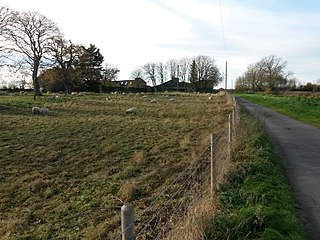
Broadholme Priory was a convent of canonesses of the Premonstratensian Order located near to the village of Broadholme. Historically in Nottinghamshire, since boundary changes in 1989, the priory and village has been in Lincolnshire.

The Holy Trinity Priory, also known as Christchurch Aldgate, was a priory of Austin canons founded around 1108 by Queen Matilda of England, wife of King Henry I, near Aldgate in London. The queen received advice and help in the foundation from Anselm of Canterbury, the Archbishop of Canterbury. The house was founded with clergy from St Botolph's Priory in Colchester, and the first prior was Norman, who was the queen's confessor. By 1115 the entire soke, or liberty of East Smithfield was given by the Knighten Guilde to the church of Holy Trinity within Aldgate. The prior of the abbey was then to sit as an ex officio Alderman of London.

The lost village of Canons Ashby is located in ground to the north of Canons Ashby House in the English county of Northamptonshire. Today there is still a small village around the house but this is located away from the original settlement, since the original settlement is now just field occupied by a herd of cows.
Ascebi is the name of the medieval village that is the lost settlement, Canons Ashby itself is currently not lost at all and people can easily find it on any map.
There have been three baronetcies created for persons with the surname Dryden, one in the Baronetage of England and two in the Baronetage of Great Britain. Two of the creations are extant and are joined under a single holder since 1874.

Hanwell is a village and civil parish in Oxfordshire, about 2 miles (3 km) northwest of Banbury. Its area is 1,240 acres (500 ha) and its highest point is about 500 feet (150 m) above sea level. The 2011 Census recorded the parish's population as 263.
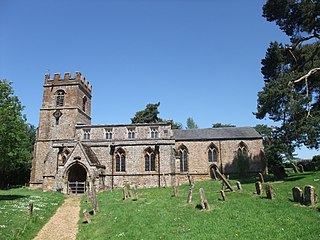
Chacombe is a village and civil parish in West Northamptonshire, England, about 3 miles (5 km) north-east of Banbury. It is bounded to the west by the River Cherwell, to the north by a tributary and to the south-east by the Banbury–Syresham road. The 2011 Census gave a parish population of 659 and a 2019 estimate 693.

Culworth is a village and civil parish about 7 miles (11 km) north of Brackley in West Northamptonshire, England. Culworth is also about 7 miles (11 km) northeast of the north Oxfordshire town of Banbury.
Charley Priory was a small former priory in Leicestershire, England.
Catesby Priory was a priory of Cistercian nuns at Lower Catesby, Northamptonshire, England. It was founded in about 1175 and dissolved in 1536.
Sir Erasmus Dryden, 1st Baronet was an English politician who sat in the House of Commons in 1624.
Sir Erasmus Henry Dryden, 5th Baronet (1669–1710) was an English Roman Catholic priest.
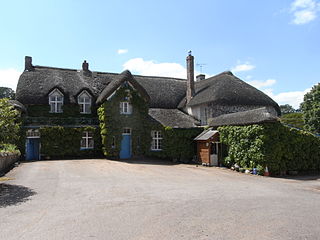
Spencer Combe in the parish of Crediton, Devon, is an historic estate. The grade II listed farmhouse known today as "Spence Combe", the remnant of a former mansion house, is situated 3 miles north-west of the town of Crediton.
Sir Alfred Erasmus Dryden, 5th and 8th Baronet was an English first-class cricketer and barrister.
